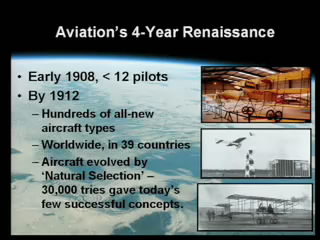People usually think about the future in terms of linear change or no change at all. They are wrong.
Rapid change

Aviation's 4-year Renaissance
There was a wonderful little short time period when marvelous things happened, starting in 1908 when the Wright Brothers flew in Paris and everyone said "Wow! Hey, I can do that!" In 4 years 39 countries had thousands of pilots.
Accelerating change
One difficulty that futurologists may be encountering is what's often viewed as an ever-quickening rate of change. The idea is that not only is progress advancing, but the rate of that progress (the rate of change) is also increasing. In addition, the rate of THAT rate of change is also increasing, and so is THAT rate. The rate of change can be modeled by the equation
for which the derivative and antiderivative (the rate of change of, and the amount of progress caused by, respectively) are also e^x. Every degree of change is increasing by the same degree of change.
This would mean that, for a futurologist, the amount of change that one sees in the last 100 years would repeat itself in only a few decades (such as 2020-2060, or 2060-2080). If true, this translates into a tremendous burden when predicting beyond twenty years into the future; one would need to careful that, in one's predictions, more and more technologies would be discovered faster and faster in any timeline.
There are, however, some challenges to the idea that the pace of change is increasing. Physicist Jonathan Huebner of the Naval Air Warfare Center recently conducted an analysis in which he found that the number of key innovations per person peaked in the late 19th or early 20th century, depending on which criteria he used. Huebner (2005) suggests that the slowing pace of technological development is probably linked to either "an economic limit of technology or a limit of the human brain that we are approaching" (p. 985). If true, then the pace of change may well slow rather than gain speed in coming years, making the more extreme visions of the next century less likely to occur.
